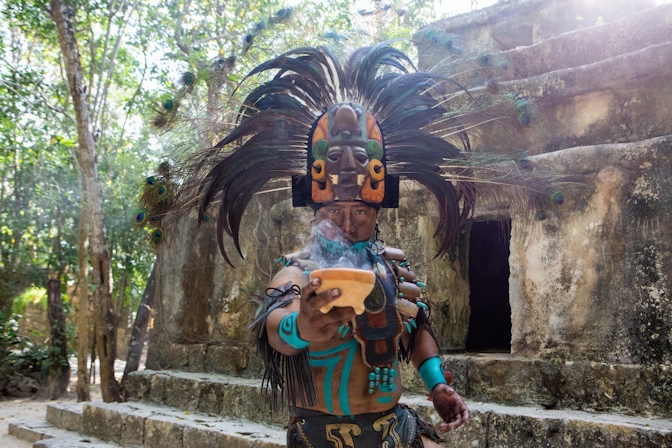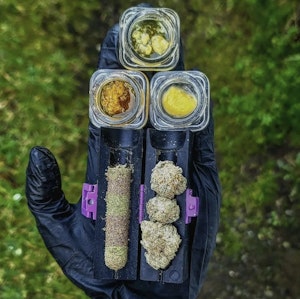
Photo by PBS
Peyote Guide: Effects, Uses, And Cultural Significance Of The Psychedelic Cactus
From desert cactus to cultural icon: uncover the ancient wisdom of peyote.
Peyote: a name that stirs intrigue in the world of psychedelics. More than just a cactus, it’s a gateway to uncharted realms of the mind and spirit. But what exactly lies beneath its prickly facade?
In this guide, we dive into the heart of peyote. From its mind-altering effects and traditional uses to its significant role in various cultures, we unravel the layers of this enigmatic cactus.
What Is Peyote?

Scientifically known as Lophophora williamsii, peyote is more than a typical plant. Native to the deserts of Mexico and the Southwestern United States, this small, spineless cactus is known for containing the hallucinogen mescaline.
When consumed, peyote offers a psychedelic experience marked by vivid visions, altered states of consciousness, and deep introspection. It’s a journey that many describe as transformative, leading to profound insights into life, spirituality, and your place in the universe.
Its use, however, is not without a few undesirable effects.
Risks And Side Effects
Other side effects of peyote consumption can include:
- Anxiety
- Dizziness
- Drooling
- Emotional instability
- Nausea
- Vomiting
- Paranoia
- Increased heart rate
- Rise in body temperature
- Muscle weakness
- Impaired motor coordination
While these side effects highlight the need for caution and respect towards this powerful cactus, the true depth of peyote’s influence lies in its psychedelic effects. These effects have captivated user’s minds and spirits for centuries, offering a glimpse into realms beyond the ordinary.
The Psychedelic Effects Of Peyote
Central to Peyote’s mind-altering experience is mescaline, a potent psychedelic compound. Mescaline directly interacts with the central nervous system, binding to serotonin and dopamine receptors to evoke profound shifts in perception and consciousness. Other hallucinogens, such as psilocybin mushrooms and LSD, target the same receptors. This intricate dance of chemistry and consciousness unfolds in several unique ways.
Altered State Of Consciousness
The primary allure of peyote is its ability to transform the user’s consciousness. This transformation can manifest as heightened awareness, altered thought patterns, and a profound connection to the universe. It’s a journey where users often report a sense of oneness with their surroundings, the dissolution of ego, and the emergence of profound philosophical insights.
Visual Hallucinations
Users often describe experiencing a kaleidoscope of colors and patterns. These effects range from subtle environmental shifts to complex, geometric shapes and vivid landscapes. Notably, peyote can induce synesthesia, a fascinating phenomenon where senses overlap – such as hearing colors and seeing sounds.
Emotional & Spiritual Experiences
Many users find peyote a catalyst for deep emotional and spiritual exploration. It facilitates intense emotional experiences, from immense joy to profound introspection. By breaking down the usual filters of perception, peyote offers a transformative experience, often leading users to life-changing spiritual insights and a renewed sense of purpose.
Physical Sensations
The physical effects of peyote can include sensations of lightness or heaviness, changes in body temperature, and a tingling sensation throughout the body. Some may experience nausea or dizziness, especially during the onset of its effects.
Duration & Intensity
The intensity and duration of peyote’s effects can vary based on several factors, including the amount consumed, the individual’s mental state, and their environment. The experience can typically last from several hours to a full day.
Cultural Significance

Peyote’s story is richly woven into numerous indigenous communities, particularly those in Mexico and the Southwestern United States. Its significance transcends mere psychedelic use, embedding itself deeply in spiritual, medicinal, and social practices.
Spiritual Rituals and Ceremonies
For centuries, peyote has been a sacred plant in Native American traditions. Tribes like the Huichol, Navajo, and many others have used peyote in religious ceremonies to foster a connection with the divine. These rituals often involve prayers, songs, and guidance from a shaman, with peyote as a bridge to spiritual realms and ancestral wisdom.
Medicinal Use
Indigenous cultures have used it to treat various ailments, from toothaches and skin conditions to more complex health conditions like diabetes and blindness. The healing power of peyote extends to emotional and psychological well-being and is often used as a tool for mental health and community healing.
Symbol of Cultural Identity and Resistance
Peyote has stood as a symbol of resilience and identity for many indigenous groups. Its use and protection have become acts of cultural preservation, helping maintain a vital link to ancestral practices and beliefs.
Art and Expression
The influence of peyote is further seen in the arts. It inspires diverse forms of creative expression, from intricate beadwork and vibrant yarn paintings to ceremonial music and rich folklore. Each piece infused with the spirit of peyote tells a unique story of reverence and connection.
With its unassuming appearance, this tiny cactus holds a wealth of history and mystery.
Contemporary Uses And Legal Status
Today, indigenous communities continue to honor peyote in sacred ceremonies, a testament to its enduring cultural heartbeat. This ancient plant, however, is now capturing attention in modern therapeutic circles. Researchers are exploring its potential in treating mental health conditions like depression and PTSD.
Legally, the landscape is complex. Peyote’s classification as a Schedule I substance by the Drug Enforcement Administration in the United States makes it largely off-limits. Still, exceptions are made to recognize its crucial role in indigenous religious practices. This legal stance is not just a matter of policy; it’s a reflection of the evolving conversation around psychedelic substances.
Conservation efforts are also gaining momentum. As peyote steps into the limelight, concerns about its sustainability grow. Conservationists advocate for protecting this revered cactus, stressing the importance of responsible harvesting to ensure its survival for future generations.
As perceptions around psychedelics evolve, so too does the dialogue surrounding peyote, inviting us to explore, understand, and appreciate its multifaceted role in our world.
Herb Recommended Products:
READ MORE










